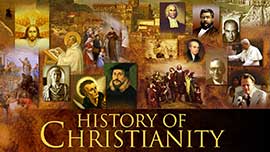JOHN V, POPE FOR JUST A YEAR
ON THIS DAY, 23 JULY 685 the bishops of Portus, Ostia, and Velitra in Italy consecrated John the Syrian as pope John V. A few weeks earlier, the Romans had elected John in the St. John Lateran basilica. He was a Syrian and his election marked the first of what would be ten consecutive easterners elected to the papacy. Infirm—indeed suffering so greatly he sometimes could not even conduct ordinations—he served as pope only a little over a year.
No earthshaking papal actions emerged during his papacy. Nonetheless John V’s story shows that even an obscure and short-term papacy has features of interest. Most notably, he was the first pope since the time of Emperor Constantine the Great who was consecrated without the usual direct approval of the Byzantine Emperor. His predecessor, Pope Benedict II, had gotten this requirement revoked; John V seems to have been the first to profit from the concession, although some scholars think he might have been preapproved because he was from the east, and others believe the regional exarch (a governor or viceroy) acted in behalf of the eastern emperor to confirm him.
John had been known to the emperor while a deacon because he served as one of Pope Agatho’s legates to the sixth ecumenical council, which met in Constantinople in 680 and 681. This council condemned the view that Christ had only a divine will and not a human, or that the human will was swallowed up in the divine. While still a deacon, before returning to Rome, John persuaded Emperor Constantine Pogonatus to lower taxes on the western church.
John’s reign was marred by a power struggle with the archbishop of Cagliari in Sardinia over the appointment of bishops to the see of Turris. John called a council and revoked the archbishop’s privilege to appoint those bishops, restoring the authority to Rome. He was also credited with issuing a declaration which, included among the acts of the sixth ecumenical council, was more likely the work of the earlier Emperor Justinian I.
John was generous, distributing large sums to clergy to assist the poor. His death led to a heated debate as to a successor, finally settled by selecting Conon, a compromise candidate. John’s tomb in Old St. Peter’s Basilica was destroyed by Arab raiders in the ninth century.
—Dan Graves
----- ----- -----
Learn more about the History of Christianity Watch it at RedeemTV
History of Christianity can be purchased at Vision Video.







